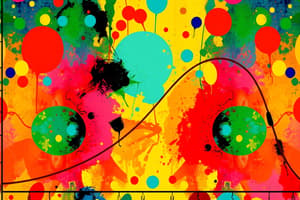Podcast
Questions and Answers
What is solubility?
What is solubility?
The maximum quantity of a substance that will dissolve in a certain quantity of solvent at a specified temperature.
What is a solute?
What is a solute?
What is being dissolved (usually a solid).
What is a solvent?
What is a solvent?
What is doing the dissolving (usually a liquid).
What is a saturated solution?
What is a saturated solution?
What is an unsaturated solution?
What is an unsaturated solution?
What does it mean to be supersaturated?
What does it mean to be supersaturated?
What happens when a supersaturated solution is agitated or a seed crystal is added?
What happens when a supersaturated solution is agitated or a seed crystal is added?
How does temperature affect solubility for solids and gases?
How does temperature affect solubility for solids and gases?
What does a solubility curve indicate?
What does a solubility curve indicate?
What does each point on the solubility curve represent?
What does each point on the solubility curve represent?
What makes a molecule polar or non-polar?
What makes a molecule polar or non-polar?
What does polarity depend on?
What does polarity depend on?
How does water dissolve an ionic solid?
How does water dissolve an ionic solid?
What is the definition of dissociation?
What is the definition of dissociation?
What are molecular substances?
What are molecular substances?
Describe how water dissolves a covalent molecular compound such as sugar.
Describe how water dissolves a covalent molecular compound such as sugar.
What does the phrase 'like dissolves like' mean?
What does the phrase 'like dissolves like' mean?
What is the difference between miscible and immiscible?
What is the difference between miscible and immiscible?
Describe the characteristics of a water molecule.
Describe the characteristics of a water molecule.
What type of intermolecular forces exist between water molecules?
What type of intermolecular forces exist between water molecules?
Define hydrogen bonding.
Define hydrogen bonding.
What do the terms 'concentrated' and 'dilute' tell you about solution concentration?
What do the terms 'concentrated' and 'dilute' tell you about solution concentration?
What does solution concentration refer to?
What does solution concentration refer to?
What is molarity?
What is molarity?
What is molality?
What is molality?
What is dilution?
What is dilution?
Study Notes
Solubility Concepts
- Solubility: Maximum amount of solute dissolvable in a solvent at a specific temperature.
- Solute: The substance that dissolves in the solvent, generally a solid.
- Solvent: The component that dissolves the solute, typically a liquid.
Types of Solutions
- Saturated Solution: Contains the maximum amount of dissolved solute at a given temperature; any additional solute will not dissolve.
- Unsaturated Solution: Has not reached equilibrium; more solute can still be dissolved.
- Supersaturated Solution: Contains more dissolved solute than it can normally hold at equilibrium, often resulting in undissolved solute at the bottom.
Solution Behavior
- Agitation or addition of a seed crystal in a supersaturated solution causes all dissolved solute to crystallize out.
- Temperature & Solubility: Heating increases solubility for solids, while it decreases solubility for gases.
Solubility Curve
- A visual representation where each point indicates the solubility of a solute at a particular temperature.
- The curve can help determine if a solution is saturated, unsaturated, or supersaturated based on its location relative to the curve.
Molecular Properties
- Polarity: A polar molecule has charged ends; a non-polar molecule has an even distribution of charge.
- Polarity Dependence: A molecule’s polarity is determined by the presence of polar covalent bonds.
Interaction Between Water and Solutes
- Dissolving Ionic Solids: Water molecules interact with positive and negative ions, leading to dissociation of the ionic compound.
- Dissolving Covalent Compounds: For compounds like sugar, polar water molecules surround and interact with the molecules without breaking them into ions.
Miscibility
- Miscible Liquids: Two liquids that completely mix together.
- Immiscible Liquids: Two liquids that do not mix, remaining separate.
Water’s Characteristics
- Water is polar, featuring a positive and negative end.
- Intermolecular Forces: Water molecules are held together by hydrogen bonding, a strong type of dipole-dipole interaction.
Solution Concentration
- Concentrated Solution: Contains a large amount of solute relative to the solvent.
- Dilute Solution: Contains a small amount of solute relative to the solvent.
- Solution Concentration: Refers to the amount of solute relative to the volume of solvent or solution.
Molarity and Molality
- Molarity (M): Concentration defined as moles of solute per liter of solution.
- Molality (m): Concentration defined as moles of solute per kilogram of solvent.
Dilution Process
- Dilution: Adding solvent to reduce solution concentration.
- Dilution Equation: M(c)V(c) = M(d)V(d), where C represents concentrated and D represents diluted solutions.
Studying That Suits You
Use AI to generate personalized quizzes and flashcards to suit your learning preferences.
Description
Test your knowledge of key terms related to solubility in this Chemistry flashcard quiz. Learn about solubility, solute, solvent, and saturated solutions as you prepare for your chemistry unit. Perfect for students seeking to master this essential topic.




